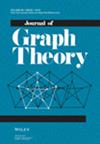计算规则图形中的三角形
IF 1
3区 数学
Q2 MATHEMATICS
Jialin He, Xinmin Hou, Jie Ma, Tianying Xie
{"title":"计算规则图形中的三角形","authors":"Jialin He, Xinmin Hou, Jie Ma, Tianying Xie","doi":"10.1002/jgt.23156","DOIUrl":null,"url":null,"abstract":"<p>In this paper, we investigate the minimum number of triangles, denoted by <span></span><math>\n <semantics>\n <mrow>\n \n <mrow>\n <mi>t</mi>\n \n <mrow>\n <mo>(</mo>\n \n <mrow>\n <mi>n</mi>\n \n <mo>,</mo>\n \n <mi>k</mi>\n </mrow>\n \n <mo>)</mo>\n </mrow>\n </mrow>\n </mrow>\n <annotation> $t(n,k)$</annotation>\n </semantics></math>, in <span></span><math>\n <semantics>\n <mrow>\n \n <mrow>\n <mi>n</mi>\n </mrow>\n </mrow>\n <annotation> $n$</annotation>\n </semantics></math>-vertex <span></span><math>\n <semantics>\n <mrow>\n \n <mrow>\n <mi>k</mi>\n </mrow>\n </mrow>\n <annotation> $k$</annotation>\n </semantics></math>-regular graphs, where <span></span><math>\n <semantics>\n <mrow>\n \n <mrow>\n <mi>n</mi>\n </mrow>\n </mrow>\n <annotation> $n$</annotation>\n </semantics></math> is an odd integer and <span></span><math>\n <semantics>\n <mrow>\n \n <mrow>\n <mi>k</mi>\n </mrow>\n </mrow>\n <annotation> $k$</annotation>\n </semantics></math> is an even integer. The well-known Andrásfai–Erdős–Sós Theorem has established that <span></span><math>\n <semantics>\n <mrow>\n \n <mrow>\n <mi>t</mi>\n \n <mrow>\n <mo>(</mo>\n \n <mrow>\n <mi>n</mi>\n \n <mo>,</mo>\n \n <mi>k</mi>\n </mrow>\n \n <mo>)</mo>\n </mrow>\n \n <mo>></mo>\n \n <mn>0</mn>\n </mrow>\n </mrow>\n <annotation> $t(n,k)\\gt 0$</annotation>\n </semantics></math> if <span></span><math>\n <semantics>\n <mrow>\n \n <mrow>\n <mi>k</mi>\n \n <mo>></mo>\n \n <mfrac>\n <mrow>\n <mn>2</mn>\n \n <mi>n</mi>\n </mrow>\n \n <mn>5</mn>\n </mfrac>\n </mrow>\n </mrow>\n <annotation> $k\\gt \\frac{2n}{5}$</annotation>\n </semantics></math>. In a striking work, Lo has provided the exact value of <span></span><math>\n <semantics>\n <mrow>\n \n <mrow>\n <mi>t</mi>\n \n <mrow>\n <mo>(</mo>\n \n <mrow>\n <mi>n</mi>\n \n <mo>,</mo>\n \n <mi>k</mi>\n </mrow>\n \n <mo>)</mo>\n </mrow>\n </mrow>\n </mrow>\n <annotation> $t(n,k)$</annotation>\n </semantics></math> for sufficiently large <span></span><math>\n <semantics>\n <mrow>\n \n <mrow>\n <mi>n</mi>\n </mrow>\n </mrow>\n <annotation> $n$</annotation>\n </semantics></math>, given that <span></span><math>\n <semantics>\n <mrow>\n \n <mrow>\n <mfrac>\n <mrow>\n <mn>2</mn>\n \n <mi>n</mi>\n </mrow>\n \n <mn>5</mn>\n </mfrac>\n \n <mo>+</mo>\n \n <mfrac>\n <mrow>\n <mn>12</mn>\n \n <msqrt>\n <mi>n</mi>\n </msqrt>\n </mrow>\n \n <mn>5</mn>\n </mfrac>\n \n <mo><</mo>\n \n <mi>k</mi>\n \n <mo><</mo>\n \n <mfrac>\n <mi>n</mi>\n \n <mn>2</mn>\n </mfrac>\n </mrow>\n </mrow>\n <annotation> $\\frac{2n}{5}+\\frac{12\\sqrt{n}}{5}\\lt k\\lt \\frac{n}{2}$</annotation>\n </semantics></math>. Here, we bridge the gap between the aforementioned results by determining the precise value of <span></span><math>\n <semantics>\n <mrow>\n \n <mrow>\n <mi>t</mi>\n \n <mrow>\n <mo>(</mo>\n \n <mrow>\n <mi>n</mi>\n \n <mo>,</mo>\n \n <mi>k</mi>\n </mrow>\n \n <mo>)</mo>\n </mrow>\n </mrow>\n </mrow>\n <annotation> $t(n,k)$</annotation>\n </semantics></math> in the entire range <span></span><math>\n <semantics>\n <mrow>\n \n <mrow>\n <mfrac>\n <mrow>\n <mn>2</mn>\n \n <mi>n</mi>\n </mrow>\n \n <mn>5</mn>\n </mfrac>\n \n <mo><</mo>\n \n <mi>k</mi>\n \n <mo><</mo>\n \n <mfrac>\n <mi>n</mi>\n \n <mn>2</mn>\n </mfrac>\n </mrow>\n </mrow>\n <annotation> $\\frac{2n}{5}\\lt k\\lt \\frac{n}{2}$</annotation>\n </semantics></math>. This confirms a conjecture of Cambie, de Joannis de Verclos, and Kang for sufficiently large <span></span><math>\n <semantics>\n <mrow>\n \n <mrow>\n <mi>n</mi>\n </mrow>\n </mrow>\n <annotation> $n$</annotation>\n </semantics></math>.</p>","PeriodicalId":16014,"journal":{"name":"Journal of Graph Theory","volume":"107 4","pages":"759-777"},"PeriodicalIF":1.0000,"publicationDate":"2024-07-25","publicationTypes":"Journal Article","fieldsOfStudy":null,"isOpenAccess":false,"openAccessPdf":"https://onlinelibrary.wiley.com/doi/epdf/10.1002/jgt.23156","citationCount":"0","resultStr":"{\"title\":\"Counting triangles in regular graphs\",\"authors\":\"Jialin He, Xinmin Hou, Jie Ma, Tianying Xie\",\"doi\":\"10.1002/jgt.23156\",\"DOIUrl\":null,\"url\":null,\"abstract\":\"<p>In this paper, we investigate the minimum number of triangles, denoted by <span></span><math>\\n <semantics>\\n <mrow>\\n \\n <mrow>\\n <mi>t</mi>\\n \\n <mrow>\\n <mo>(</mo>\\n \\n <mrow>\\n <mi>n</mi>\\n \\n <mo>,</mo>\\n \\n <mi>k</mi>\\n </mrow>\\n \\n <mo>)</mo>\\n </mrow>\\n </mrow>\\n </mrow>\\n <annotation> $t(n,k)$</annotation>\\n </semantics></math>, in <span></span><math>\\n <semantics>\\n <mrow>\\n \\n <mrow>\\n <mi>n</mi>\\n </mrow>\\n </mrow>\\n <annotation> $n$</annotation>\\n </semantics></math>-vertex <span></span><math>\\n <semantics>\\n <mrow>\\n \\n <mrow>\\n <mi>k</mi>\\n </mrow>\\n </mrow>\\n <annotation> $k$</annotation>\\n </semantics></math>-regular graphs, where <span></span><math>\\n <semantics>\\n <mrow>\\n \\n <mrow>\\n <mi>n</mi>\\n </mrow>\\n </mrow>\\n <annotation> $n$</annotation>\\n </semantics></math> is an odd integer and <span></span><math>\\n <semantics>\\n <mrow>\\n \\n <mrow>\\n <mi>k</mi>\\n </mrow>\\n </mrow>\\n <annotation> $k$</annotation>\\n </semantics></math> is an even integer. The well-known Andrásfai–Erdős–Sós Theorem has established that <span></span><math>\\n <semantics>\\n <mrow>\\n \\n <mrow>\\n <mi>t</mi>\\n \\n <mrow>\\n <mo>(</mo>\\n \\n <mrow>\\n <mi>n</mi>\\n \\n <mo>,</mo>\\n \\n <mi>k</mi>\\n </mrow>\\n \\n <mo>)</mo>\\n </mrow>\\n \\n <mo>></mo>\\n \\n <mn>0</mn>\\n </mrow>\\n </mrow>\\n <annotation> $t(n,k)\\\\gt 0$</annotation>\\n </semantics></math> if <span></span><math>\\n <semantics>\\n <mrow>\\n \\n <mrow>\\n <mi>k</mi>\\n \\n <mo>></mo>\\n \\n <mfrac>\\n <mrow>\\n <mn>2</mn>\\n \\n <mi>n</mi>\\n </mrow>\\n \\n <mn>5</mn>\\n </mfrac>\\n </mrow>\\n </mrow>\\n <annotation> $k\\\\gt \\\\frac{2n}{5}$</annotation>\\n </semantics></math>. In a striking work, Lo has provided the exact value of <span></span><math>\\n <semantics>\\n <mrow>\\n \\n <mrow>\\n <mi>t</mi>\\n \\n <mrow>\\n <mo>(</mo>\\n \\n <mrow>\\n <mi>n</mi>\\n \\n <mo>,</mo>\\n \\n <mi>k</mi>\\n </mrow>\\n \\n <mo>)</mo>\\n </mrow>\\n </mrow>\\n </mrow>\\n <annotation> $t(n,k)$</annotation>\\n </semantics></math> for sufficiently large <span></span><math>\\n <semantics>\\n <mrow>\\n \\n <mrow>\\n <mi>n</mi>\\n </mrow>\\n </mrow>\\n <annotation> $n$</annotation>\\n </semantics></math>, given that <span></span><math>\\n <semantics>\\n <mrow>\\n \\n <mrow>\\n <mfrac>\\n <mrow>\\n <mn>2</mn>\\n \\n <mi>n</mi>\\n </mrow>\\n \\n <mn>5</mn>\\n </mfrac>\\n \\n <mo>+</mo>\\n \\n <mfrac>\\n <mrow>\\n <mn>12</mn>\\n \\n <msqrt>\\n <mi>n</mi>\\n </msqrt>\\n </mrow>\\n \\n <mn>5</mn>\\n </mfrac>\\n \\n <mo><</mo>\\n \\n <mi>k</mi>\\n \\n <mo><</mo>\\n \\n <mfrac>\\n <mi>n</mi>\\n \\n <mn>2</mn>\\n </mfrac>\\n </mrow>\\n </mrow>\\n <annotation> $\\\\frac{2n}{5}+\\\\frac{12\\\\sqrt{n}}{5}\\\\lt k\\\\lt \\\\frac{n}{2}$</annotation>\\n </semantics></math>. Here, we bridge the gap between the aforementioned results by determining the precise value of <span></span><math>\\n <semantics>\\n <mrow>\\n \\n <mrow>\\n <mi>t</mi>\\n \\n <mrow>\\n <mo>(</mo>\\n \\n <mrow>\\n <mi>n</mi>\\n \\n <mo>,</mo>\\n \\n <mi>k</mi>\\n </mrow>\\n \\n <mo>)</mo>\\n </mrow>\\n </mrow>\\n </mrow>\\n <annotation> $t(n,k)$</annotation>\\n </semantics></math> in the entire range <span></span><math>\\n <semantics>\\n <mrow>\\n \\n <mrow>\\n <mfrac>\\n <mrow>\\n <mn>2</mn>\\n \\n <mi>n</mi>\\n </mrow>\\n \\n <mn>5</mn>\\n </mfrac>\\n \\n <mo><</mo>\\n \\n <mi>k</mi>\\n \\n <mo><</mo>\\n \\n <mfrac>\\n <mi>n</mi>\\n \\n <mn>2</mn>\\n </mfrac>\\n </mrow>\\n </mrow>\\n <annotation> $\\\\frac{2n}{5}\\\\lt k\\\\lt \\\\frac{n}{2}$</annotation>\\n </semantics></math>. This confirms a conjecture of Cambie, de Joannis de Verclos, and Kang for sufficiently large <span></span><math>\\n <semantics>\\n <mrow>\\n \\n <mrow>\\n <mi>n</mi>\\n </mrow>\\n </mrow>\\n <annotation> $n$</annotation>\\n </semantics></math>.</p>\",\"PeriodicalId\":16014,\"journal\":{\"name\":\"Journal of Graph Theory\",\"volume\":\"107 4\",\"pages\":\"759-777\"},\"PeriodicalIF\":1.0000,\"publicationDate\":\"2024-07-25\",\"publicationTypes\":\"Journal Article\",\"fieldsOfStudy\":null,\"isOpenAccess\":false,\"openAccessPdf\":\"https://onlinelibrary.wiley.com/doi/epdf/10.1002/jgt.23156\",\"citationCount\":\"0\",\"resultStr\":null,\"platform\":\"Semanticscholar\",\"paperid\":null,\"PeriodicalName\":\"Journal of Graph Theory\",\"FirstCategoryId\":\"100\",\"ListUrlMain\":\"https://onlinelibrary.wiley.com/doi/10.1002/jgt.23156\",\"RegionNum\":3,\"RegionCategory\":\"数学\",\"ArticlePicture\":[],\"TitleCN\":null,\"AbstractTextCN\":null,\"PMCID\":null,\"EPubDate\":\"\",\"PubModel\":\"\",\"JCR\":\"Q2\",\"JCRName\":\"MATHEMATICS\",\"Score\":null,\"Total\":0}","platform":"Semanticscholar","paperid":null,"PeriodicalName":"Journal of Graph Theory","FirstCategoryId":"100","ListUrlMain":"https://onlinelibrary.wiley.com/doi/10.1002/jgt.23156","RegionNum":3,"RegionCategory":"数学","ArticlePicture":[],"TitleCN":null,"AbstractTextCN":null,"PMCID":null,"EPubDate":"","PubModel":"","JCR":"Q2","JCRName":"MATHEMATICS","Score":null,"Total":0}
引用次数: 0
摘要
在本文中,我们将研究有顶点不规则图形中三角形的最小数量,用 表示,其中 为奇数整数, 为偶数整数。著名的 Andrásfai-Erdős-Sós 定理证明,如果 .在一项引人注目的工作中,Lo 提供了足够大的 , 的精确值,即 .在这里,我们通过确定整个范围内 的精确值,弥补了上述结果之间的差距。这证实了康比、德-乔尼斯-德-韦尔克洛斯和康对足够大的 .本文章由计算机程序翻译,如有差异,请以英文原文为准。

Counting triangles in regular graphs
In this paper, we investigate the minimum number of triangles, denoted by , in -vertex -regular graphs, where is an odd integer and is an even integer. The well-known Andrásfai–Erdős–Sós Theorem has established that if . In a striking work, Lo has provided the exact value of for sufficiently large , given that . Here, we bridge the gap between the aforementioned results by determining the precise value of in the entire range . This confirms a conjecture of Cambie, de Joannis de Verclos, and Kang for sufficiently large .
求助全文
通过发布文献求助,成功后即可免费获取论文全文。
去求助
来源期刊

Journal of Graph Theory
数学-数学
CiteScore
1.60
自引率
22.20%
发文量
130
审稿时长
6-12 weeks
期刊介绍:
The Journal of Graph Theory is devoted to a variety of topics in graph theory, such as structural results about graphs, graph algorithms with theoretical emphasis, and discrete optimization on graphs. The scope of the journal also includes related areas in combinatorics and the interaction of graph theory with other mathematical sciences.
A subscription to the Journal of Graph Theory includes a subscription to the Journal of Combinatorial Designs .
×
引用
GB/T 7714-2015
复制
MLA
复制
APA
复制
导出至
BibTeX
EndNote
RefMan
NoteFirst
NoteExpress
请完成安全验证×
微信好友
朋友圈
QQ好友
复制链接
取消

已复制链接
快去分享给好友吧!
我知道了

点击右上角分享
相关文献
 求助内容:
求助内容: 应助结果提醒方式:
应助结果提醒方式:
